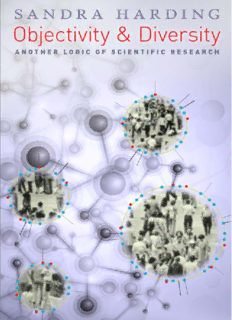Table Of ContentObjectivity and Diversity
Objectivity and Diversity
Another Logic of Scientific Research
Sandra Harding
The University of Chicago Press :: Chicago and London
Sandra Harding is Distinguished Professor of Education and Gender
Studies at the University of California, Los Angeles, and Distinguished
Affiliate Professor of Philosophy at Michigan State University. She is the
editor of The Postcolonial Science and Technology Studies Reader and
the author of Sciences from Below: Feminisms, Postcolonialities, and
Modernities.
The University of Chicago Press, Chicago 60637
The University of Chicago Press, Ltd., London
© 2015 by The University of Chicago
All rights reserved. Published 2015.
Printed in the United States of America
24 23 22 21 20 19 18 17 16 15 1 2 3 4 5
isbn- 13: 978- 0- 226- 24122- 7 (cloth)
isbn- 13: 978- 0- 226- 24136- 4 (paper)
isbn- 13: 978- 0- 226- 24153- 1 (e- book)
doi: 10.7208/chicago/9780226241531.001.0001
Library of Congress Cataloging-in-Publication Data
Harding, Sandra G., author.
Objectivity and diversity : another logic of scientific research /
Sandra Harding.
pages cm
Includes bibliographical references and index.
isbn 978-0-226-24122-7 (cloth : alk. paper)—
isbn 978-0-226-24136-4 (pbk. : alk. paper)—isbn 978-0-226-24153-1
(e-book) 1. Science—Philosophy. 2. Objectivity. 3. Science—Social
aspects. I. Title
q175.h324 2015
507.2—dc23
2014041598
a This paper meets the requirements of ansi/niso z39.48- 1992
(Permanence of Paper).
Contents
Acknowledgments vii
Preface ix
1 New Citizens, New Societies: New Sciences, New
Philosophies? 1
2 Stronger Objectivity for Sciences from Below 26
3 Women, Gender, Development: Maximally Objective
Research? 52
4 Do Micronesian Navigators Practice Science? 80
5 Pluralism, Multiplicity, and the Disunity of Sciences 105
6 Must Sciences Be Secular? 127
7 After Mr. Nowhere: New Proper Scientific Selves 150
Notes 175
Bibliography 189
Index 207
Acknowledgments
Many scholars, activists, and friends have improved my
thinking on the topics of this book. I am especially grate-
ful to Warwick Anderson, Cynthia Enloe, David Hess,
Gail Kligman, Francoise Lionnet, Jim Maffie, John Mc-
Cumber, Suman Seth, Kim TallBear, J. Ann Tickner,
Nancy Tuana, Marguerite Waller, Alice Wexler, and Ali-
son Wylie.
I owe a special debt of gratitude to the members of
the Philosophy Department at Michigan State University,
which has hosted me for one month a year from 2010 to
2014. I have tried out drafts of every chapter of the book
on them, and have always received valuable feedback. I
thank especially Richard Peterson, Kristie Dotson, and
Kyle Powys Whyte.
Lecture and conference audiences have improved ev-
ery chapter. Especially valuable have been responses at
the Arctic Center and University of Lapland in Rovani-
emi, Finland; the Universities of Praetoria, Western Cape,
and KwaZulu- Natal in South Africa; the Max Planck In-
stitute at the University of Halle, Germany; and Outside
Philosophy in Los Angeles.
My colleagues and students in the graduate Depart-
ment of Education at UCLA have kept me grounded in
the realities of knowledge production and dissemination
for a decade and a half. Their commitment to improve
Acknowledgments viii
the educational resources available to children and their communities
around the globe have helped to keep this philosopher focused on the
fact that epistemologies and philosophies of science have immense prac-
tical consequences for people’s abilities to survive and flourish. I am ex-
tremely fortunate to have had the opportunity to get to understand their
passion for epistemic equality and their brilliance at designing strategies
to advance social justice.
Karen Merikangas Darling at the University of Chicago Press has
provided me with splendid editorial resources and advice. Comments
from the anonymous external reviewers immensely improved the manu-
script. Sarah Ruth Lillo and Melissa Goodnight helped me track down
relevant sources and organize the typescript.
My dear housemates, Emily and Eva Harding- Morick, made every-
day life a joy throughout the writing of this book.
Preface
Worries about objectivity just won’t go away. Issues
about what should be the role, if any, of values and in-
terests in scientific research are as old as Galileo and the
Enlightenment, and as new as the recent public debates
about stem cell research, women’s math and science abili-
ties, intelligent design, poor people’s high birthrates, and
the causes of climate change.
In many cases, of course, the invocation of “objectiv-
ity” for a knowledge claim has more to do with attempts
to boost the status of the claim than with any actual cri-
teria the claim has satisfied, as philosopher Ian Hacking
(forthcoming) points out. “Objectivity” is just an “eleva-
tor word” and we should all please refrain from using it,
he argues. While Hacking is undoubtedly right about the
proliferation of substantively meaningless claims to ob-
jectivity, I think the term remains far too powerful sim-
ply to abandon to such boosters. Moreover, there remain
ways in which the term has not worn out its usefulness in
spite of its overuse as an elevator word. This study pur-
sues such possibilities.
Continued concern with the term “objectivity” and
what it could stand for testifies to the fact that objectivity
is good to think with, to borrow a phrase from anthropol-
ogy. It is invoked at the juncture of a number of current
anxieties and debates about relationships between rapidly
Description:Worries about scientific objectivity seem never-ending. Social critics and philosophers of science have argued that invocations of objectivity are often little more than attempts to boost the status of a claim, while calls for value neutrality may be used to suppress otherwise valid dissenting posit

